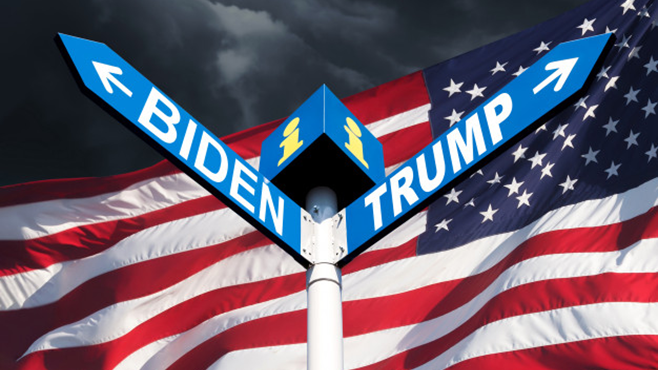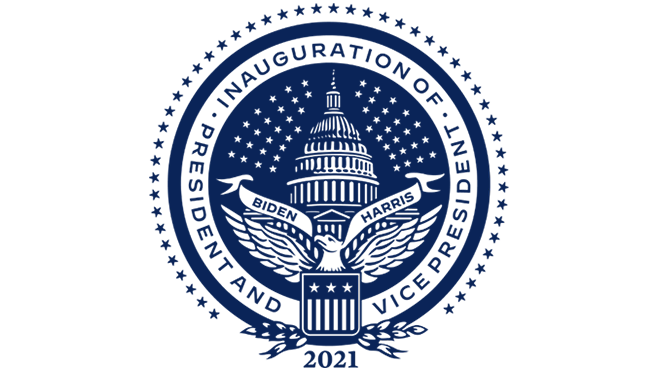
President Trump departed the White House for the last time this morning, flying to Joint Base Andrews for a ceremony where he delivered remarks at a send off ceremony. President Trump wished the new administration “great luck and great success” before departing for West Palm Beach, FL.
President Trump will not be at president-elect Joe Biden’s inauguration this morning, becoming the first President to skip the event since 1869.

As President-elect Joe Biden’s term begins at 11a today, it will be an Inauguration Day for the history books: Kamala Harris will officially be the first female vice president — and the first Black and South Asian woman to take the role. There’s a pandemic raging across the country, and the outgoing commander-in-chief is being impeached because of a deadly riot at the U.S. Capitol. And the date is a palindrome that won’t happen for another thousand years. Not in modern times has an inauguration been staged amid such domestic turmoil. But while the 59th inaugural ceremonies will be much smaller because of security concerns and health risks, Biden and Harris will still take the oath of office on the Capitol’s West Front.
On his first day in office, President-elect Joe Biden is expected to sign 17 executive actions —15 will be executive orders, some of which will reverse decisions made by his predecessor, President Trump. The executive actions will make changes to the U.S. response to the COVID- 19 pandemic and try to ease some of the financial strain placed on Americans resulting from the
pandemic. But other executive actions directly target and undo President Trump’s actions on the environment, immigration, the U.S. census, and regulatory changes. Mr. Biden will sign the executive actions in the Oval Office on Wednesday afternoon, incoming White House press secretary Jen Psaki told reporters on Tuesday night.
After taking the oath of office on Wednesday, President-elect Joe Biden will send Congress a proposal that would allow millions of undocumented immigrants in the U.S. to apply for legal status, increase aid to Central America, refocus border control measures and expand legal
immigration, according to incoming White House officials. The centerpiece of the sweeping plan, dubbed the U.S. Citizenship Act of 2021, is a legalization provision with two different pathways. Temporary Protected Status holders, farm workers and undocumented immigrants brought to the
U.S. as children would be eligible to apply for green cards immediately and for U.S. citizenship after three years. Other eligible undocumented immigrants, including workers deemed essential during the coronavirus, would be able to apply for work permits and temporary deportation relief.
After five years, they could request permanent residence and become naturalized U.S. citizens after another three years. All applicants would need to pay fees, file taxes, pass background and criminal checks and satisfy certain prerequisites, including living in the U.S. before January 1, 2021. Applicants would lose their place in line if they are convicted of certain crimes.
Kamala Harris will be inaugurated to her new job as vice president on Wednesday. One of her first acts will be swearing in the Californian replacing her in the Senate, Alex Padilla. The Democrat resigned her Senate seat on Monday, and Padilla has resigned as the California secretary of
state. But he has yet to be sworn in as senator. The vice president conducts the swearing-in of senators and serves as the president of the Senate. After her noon inauguration Wednesday alongside President-elect Joe Biden, Harris will take over for Vice President Mike Pence in that role. Harris is expected to swear in Padilla and two other Democrats, Georgia Sens.-elect the Rev. Raphael Warnock and Jon Ossoff, shortly thereafter, an aide confirmed.
The Biden transition team has declined to give outgoing acting Defense Secretary Christopher Miller office space and resources for his transition out of the role, according to a Biden transition official. In the past it has been a courtesy to provide transitioning office space and resources to
departing secretaries of defense. “Given Mr. Miller’s acting capacity in that role, as well as reduced staffing and occupation of the Pentagon and auxiliary offices during Covid-19, we deemed it appropriate not to extend that perk in this instance,” the official said. Miller was named acting secretary on November 9.

